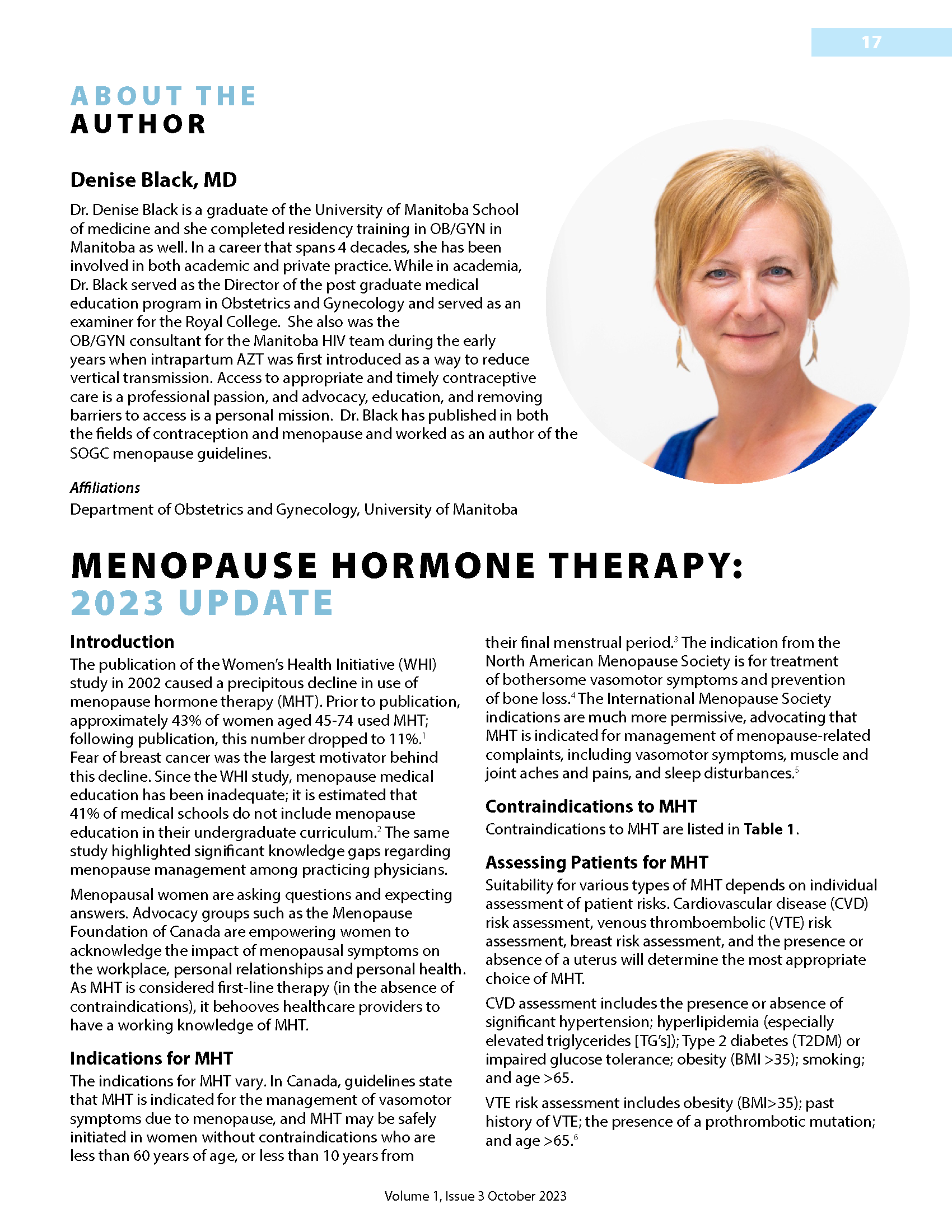Menopause Hormone Therapy: 2023 Update
DOI:
https://doi.org/10.58931/cpct.2023.1320Abstract
The publication of the Women’s Health Initiative (WHI) study in 2002 caused a precipitous decline in use of menopause hormone therapy (MHT). Prior to publication, approximately 43% of women aged 45–74 used MHT; following publication, this number dropped to 11%. Fear of breast cancer was the largest motivator behind this decline. Since the WHI study, menopause medical education has been inadequate; it is estimated that 41% of medical schools do not include menopause education in their undergraduate curriculum. The same study highlighted significant knowledge gaps regarding menopause management among practicing physicians.
Menopausal women are asking questions and expecting answers. Advocacy groups such as the Menopause Foundation of Canada are empowering women to acknowledge the impact of menopausal symptoms on the workplace, personal relationships and personal health. As MHT is considered first-line therapy (in the absence of contraindications), it behooves healthcare providers to have a working knowledge of MHT.
References
Langer RD, Hodis HN, Lobo RA, Allison MA. Hormone replacement therapy–where are we now? Climacteric. 2021 Jan 2;24(1):3-10. DOI: https://doi.org/10.1080/13697137.2020.1851183
Armeni E, Mili N, Siliogka E, Goulis DG, Lambrinoudaki I. Menopause medical education around the world: the way forward to serve women’s health. Current Opinion in Endocrine and Metabolic Research. 2022 Aug 5:100387. DOI: https://doi.org/10.1016/j.coemr.2022.100387
Yuksel N, Evaniuk D, Huang L, Malhotra U, Blake J, Wolfman W, Fortier M. Guideline no. 422a: menopause: vasomotor symptoms, prescription therapeutic agents, complementary and alternative medicine, nutrition, and lifestyle. Journal of Obstetrics and Gynaecology Canada. 2021 Oct 1;43(10):1188-204. DOI: https://doi.org/10.1016/j.jogc.2021.08.003
Faubion SS, Crandall CJ, Davis L, El Khoudary SR, Hodis HN, Lobo RA, Maki PM, Manson JE, Pinkerton JV, Santoro NF, Shifren JL. The 2022 hormone therapy position statement of The North American Menopause Society. Menopause. 2022 Jul 1;29(7):767-94. DOI: https://doi.org/10.1097/GME.0000000000002028
Baber RJ, Panay N, Fenton AT. 2016 IMS Recommendations on women’s midlife health and menopause hormone therapy. Climacteric. 2016 Mar 3;19(2):109-50. DOI: https://doi.org/10.3109/13697137.2015.1129166
Black D. The safety of oral versus transdermal estrogen. Menopause. 2020 Nov 1;27(11):1328-9. DOI: https://doi.org/10.1097/GME.0000000000001636
Kapoor E, Kling JM, Lobo AS, Faubion SS. Menopausal hormone therapy in women with medical conditions. Best Practice & Research Clinical Endocrinology & Metabolism. 2021 Dec 1;35(6):101578. DOI: https://doi.org/10.1016/j.beem.2021.101578
Berg WA, Seitzman RL, Pushkin JA. Implementing the National Dense Breast Reporting Standard, Expanding supplemental screening using current guidelines, and the proposed Find It Early Act. J Breast Imaging. 2023 Apr 15:wbad034. DOI: https://doi.org/10.1093/jbi/wbad034 DOI: https://doi.org/10.1093/jbi/wbad034
Greendale GA, Reboussin BA, Slone S, Wasilauskas C, Pike MC, Ursin G. Postmenopausal hormone therapy and change in mammographic density. Journal of the National Cancer Institute. 2003 Jan 1;95(1):30-7. DOI: https://doi.org/10.1093/jnci/95.1.30
Jacobson M, Mills K, Graves G, Wolfman W, Fortier M. Guideline No. 422f: Menopause and breast cancer. Journal of Obstetrics and Gynaecology Canada. 2021 Dec 1;43(12):1450-6. DOI: https://doi.org/10.1016/j.jogc.2021.09.011
Depypere H, Inki P. The levonorgestrel-releasing intrauterine system for endometrial protection during estrogen replacement therapy: a clinical review. Climacteric. 2015 Jul 4;18(4):470-82. DOI: https://doi.org/10.3109/13697137.2014.991302
Kenemans P, Speroff L, International Tibolone Consensus Group. Tibolone: clinical recommendations and practical guidelines: a report of the International Tibolone Consensus Group. Maturitas. 2005 May 16;51(1):21-8. DOI: https://doi.org/10.1016/j.maturitas.2005.02.011
Lundström E, Christow A, Kersemaekers W, Svane G, Azavedo E, Söderqvist G, Mol-Arts M, Barkfeldt J, von Schoultz B. Effects of tibolone and continuous combined hormone replacement therapy on mammographic breast density. American Journal of Obstetrics and Gynecology. 2002 Apr 1;186(4):717-22. DOI: https://doi.org/10.1067/mob.2002.121896
Hammar ML, Van De Weijer P, Franke HR, Pornel B, Von Mauw EM, Nijland EA, TOTAL Study Investigators Group. Tibolone and low‐dose continuous combined hormone treatment: vaginal bleeding pattern, efficacy and tolerability. BJOG. 2007 Dec;114(12):1522-9. DOI: https://doi.org/10.1111/j.1471-0528.2007.01537.x
Archer DF, Lewis V, Carr BR, Olivier S, Pickar JH. Bazedoxifene/conjugated estrogens (BZA/CE): incidence of uterine bleeding in postmenopausal women. Fertility and Sterility. 2009 Sep 1;92(3):1039-44. DOI: https://doi.org/10.1016/j.fertnstert.2009.05.093
Harvey JA, Pinkerton JV, Baracat EC, Shi H, Chines AA, Mirkin S. Breast density changes in a randomized controlled trial evaluating bazedoxifene/conjugated estrogens. Menopause. 2013 Feb 1;20(2):138‑45. DOI: https://doi.org/10.1097/GME.0b013e318271f5e7
Black, D. Diagnosis and medical management of premenopausal and postmenopausal bleeding. Climacteric 2023;26(3):222-228. DOI: https://doi.org/10.1080/13697137.2023.2178893
Kim SE, Lee DY, Choi D. Tissue-selective estrogen complex for women who experience breast discomfort or vaginal bleeding when on hormone therapy. Menopause. 2019 Apr 1;26(4):383-6. DOI: https://doi.org/10.1097/GME.0000000000001244
Boardman HM, Hartley I, Eisinga A, et al. Hormone therapy for preventing cardiovascular disease in post-menopausal women. Cochrane Database Syst Rev. 2015 Mar 10;2015(3):CD002229. DOI: https://doi.org/10.1002/14651858.CD002229.pub4
Collaborative Group on Hormonal Factors in Breast Cancer. Type and timing of menopausal hormone therapy and breast cancer risk: individual participant meta-analysis of the worldwide epidemiological evidence. Lancet. 2019 Sep 28;394(10204):1159-68. DOI: https://doi.org/10.1016/S0140-6736(19)31709-X

Published
How to Cite
Issue
Section
License
Copyright (c) 2023 Canadian Primary Care Today

This work is licensed under a Creative Commons Attribution-NonCommercial-NoDerivatives 4.0 International License.
